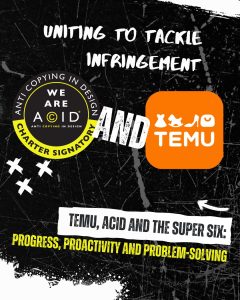

Meet Peter Dunne, one of ACID’s original members — Member 24, no less — whose career has spanned retail management, innovative product design, business leadership, and now the stewardship of a truly iconic brand. As the original founder of CellarDine who, after 27 years, sold his business to another ACID member, Peter has recently taken on a new chapter, taking over his uncle’s company, Rosslynstone — the remarkable company involved in crafting awards and gifts from marble, including the bases for the iconic BAFTA award. With a rich heritage of craftsmanship spanning over four decades, Peter brings his deep-rooted passion for design and protection of original work into this exciting new venture. We caught up with him to talk about his journey, the importance of IP, and why ACID remains a vital part of his business story.

You were one of ACID’s earliest members — Member 24! Can you tell us what first inspired you to join, and what IP challenges you were facing at the time with CellarDine?
I’ve always felt very passionate about creating something a little different and unique but, in order to do this, there is also a time and financial pressure to ensure that the end product captures the imagination and enthusiasm from both the trade and the public. When I first started developing innovative products, I was fully aware of the implications if we did not secure some form of protection, whether this be patents, design registrations or trade marks. ACID’s superb advice and guidance in earlier years and joining as a member provided some comfort and security which was crucial to protecting our original investments and to make sure our customers were rewarded in receiving something unique.
You’ve had quite a journey — from founding CellarDine, to selling your business, and now taking the reins at Rosslynstone. What drew you to your uncle’s business, and how does it feel stepping into such a unique creative legacy?
Rosslynstone has been around for decades and my uncle has 50 plus years of experience in designing, sourcing and working with a huge variety of materials to produce awards. For me, the appeal was to be able to use my design, sourcing and manufacturing experience to help take the business forward. Being involved with a family business and taking over from somebody who has done such an amazing job is never easy; however we’ve already started to evolve the business with its first ever website and we are now reaching out to new and exciting customers UK and globally. These are just the first steps – it is truly an exciting time for the business!
Rosslynstone has been crafting parts and at times producing all of the iconic BAFTA awards for decades. What kind of IP protection is important for a business with such a distinctive and prestigious product?
Obviously, given the nature of working with Bafta, there’s a lot I will need to keep confidential; however and certainly for the past 30 plus years we have been producing the marble bases which have a distinct design and quality material used. IP is critical not just for a prestigious client like Bafta but for any client we work with; everybody likes something a little different and a bit unique and it’s our job to produce an award that demonstrates our own passion and more importantly gives justice to the story behind the award.

Having been an ACID member under two ownership businesses, what have you found most valuable about ACID’s support and services throughout your career?
When we used to undertake trade shows, having expert legal support behind the scenes was a real benefit. It served as a deterrent to third party suppliers and retailers who were looking to potentially copy products. It’s the old saying; “prevention is better than cure”. We fully maximised the ACID logo on all of our company literature, website, business cards, exhibition stands and point of sale material. We also benefited from the ACID IP Databank which allowed us to secure ideas, concepts and initial prototypes at an early stage. Having worked with ACID for 25 plus years, I am a big fan and got to know some of the team members quite well. This was very useful and the whole ACID team are a delight to work with.
Why was it important to you to bring Rosslynstone into ACID membership now that you’re leading the business?
I genuinely feel that it offers our business a sense of security and comfort given that we are protecting not just our own investment and IP but that of our customers. Investing in innovation can be very significant and having somebody completely copy your idea or product without any hesitation or respect for what I call the “hard yards and sacrifice” to create that next innovative product is quite devastating. Any sector that creates product innovation which is crucial for growth and development in my opinion should be protected at all costs. Rosslynstone is no different and, if I am able to take the business to another level, being part of ACID will provide some comfort and allow us to continue to invest and grow.
Many people might not realise the craftsmanship and originality that goes into awards like the BAFTAs. How do you protect your designs from being copied or imitated?
I’m not in a position to talk too much about Bafta but what I can say from a product development point of view and minimising the potential for our products to be copied, we do have non-disclosure agreements with our suppliers. We are also very careful regarding the type of materials to be used. In addition, I have a dedicated team in Italy who manage our consistent quality that we produce. If somebody is going to blatantly copy your product, they will find a way of getting round a patent; however, it’s next to impossible to compete with something that’s an original. A copy will always be a copy the original I believe has much more value.

Do you think attitudes toward design protection and IP awareness have changed since you first joined ACID — and what role has ACID played in that shift?
I personally feel very passionate about product development and IP protection. The sacrifice that goes into developing something original is a long process and it’s not just financial. I think ACID has played a pivotal role since its incorporation and certainly over the past 10 years; it’s not just the profile of ACID but the necessity to protect originality in the media that seems to be getting more attention which is positive. We need to tell more stories of what it takes to create something new, innovative and unique; I would certainly love to produce awards for those very people that have taken the time & run the “hard yards” in creating the next best product or service, our country needs innovation, so let’s support it!
What advice would you give to designers or creative businesses just starting out, when it comes to safeguarding their IP from day one?
Joining ACID would be a good start; however it is crucial to keep any concept drawings or ideas to yourself if you’re considering a patent otherwise as soon as it comes into the public domain they can no longer be protected. Investing in patents is expensive, soI would thoroughly recommend exploring the revenue opportunities for your new product or service and compare this to the cost involved (a simple cash in and out flow forecast) as it’s unlikely you’ll make huge profits in the first couple of years. Take time to understand your supplier partner, ensure you have solid NDA’s in place and set aside a sensible budget for prototypes and testing ,as these also need to be managed very carefully and undertake certificates with the correct testing houses such as SGS, Bureau Veritas or Intertek.

ACID values the support of its members to enable it to campaign for design law reform. Do you have any messages for Government/Policy Makers on IP issues? Do you think that copying of designs is deliberate and blatant?
Frankly speaking I think governments over the past two decades have been incredibly slow in protecting individuals or SMEs when it comes to IP issues. I think the deterrents are not severe enough and it allows large companies to take advantage. On the one hand we are crying out for innovation to be invested in this country yet at the same time we are allowing large companies to simply copy originality without any serious repercussions. At some point the desire to invest in innovation will deteriorate to such a level that we will be stuck in a cycle of seeing the same product, the same design, at the same price point; it’s not good for business or for the consumer and not for our country’s ambitions domestically or globally.
As far as deliberately copying somebody’s product and being so blatant, sadly this is very much the case. Copy companies simply want to avoid making the investment because they want the revenue and profits far quicker. If the repercussions of getting caught copying somebody’s product are fairly limited then what’s the incentive to stop doing it in the first place? Set up a system where “copy companies” can be named and highlight the investment made by the original inventor to demonstrate lost earnings; make it very transparent.
Have you signed the ACID IP Charter?
Yes
Spread the Word

Latest News





Newsletter Sign-Up
| Cookie | Duration | Description |
|---|---|---|
| cookielawinfo-checkbox-analytics | 11 months | This cookie is set by GDPR Cookie Consent plugin. The cookie is used to store the user consent for the cookies in the category "Analytics". |
| cookielawinfo-checkbox-functional | 11 months | The cookie is set by GDPR cookie consent to record the user consent for the cookies in the category "Functional". |
| cookielawinfo-checkbox-necessary | 11 months | This cookie is set by GDPR Cookie Consent plugin. The cookies is used to store the user consent for the cookies in the category "Necessary". |
| cookielawinfo-checkbox-others | 11 months | This cookie is set by GDPR Cookie Consent plugin. The cookie is used to store the user consent for the cookies in the category "Other. |
| cookielawinfo-checkbox-performance | 11 months | This cookie is set by GDPR Cookie Consent plugin. The cookie is used to store the user consent for the cookies in the category "Performance". |
| viewed_cookie_policy | 11 months | The cookie is set by the GDPR Cookie Consent plugin and is used to store whether or not user has consented to the use of cookies. It does not store any personal data. |